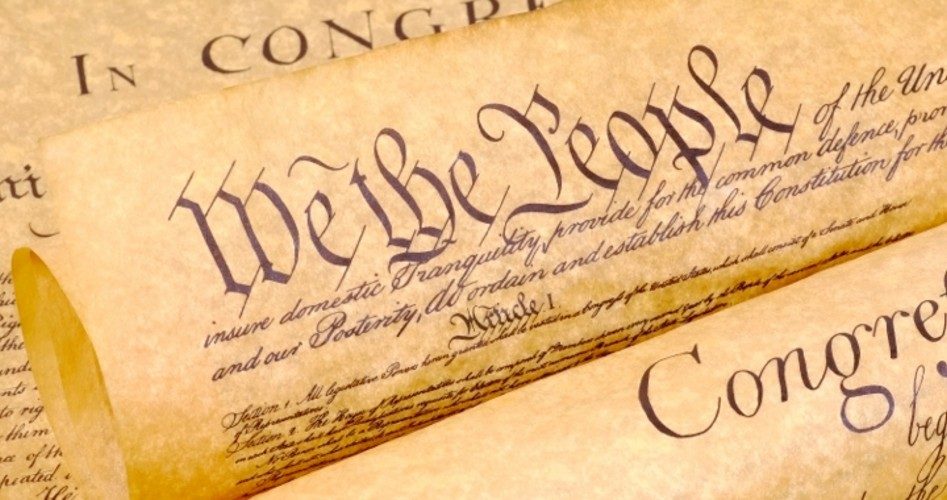
North Carolina’s State Board of Education would require that students learn principles that were fundamental to the founding of the United States, if legislation now being considered in the Tar Heel State is enacted.
Senate Bill 524 passed the state Senate by a vote of 35-13 and is now awaiting action by the state House of Representatives Committee on Rules, Calendar, and Operations.
Specifically, the measure would “require during the high school years the teaching of a semester course” that would include lessons in the following topics, considered by sponsors of the bill to be the “Founding Principles of the United States of America”:
a. The Creator‑endowed inalienable rights of the people.
b. Structure of government, separation of powers with checks and balances.
c. Frequent and free elections in a representative government.
d. Rule of law.
e. Equal justice under the law.
f. Private property rights.
g. Federalism.
h. Due process.
i. Individual rights as set forth in the Bill of Rights.
j. Individual responsibility.
k. Constitutional limitations on government power to tax and spend and prompt payment of public debt.
l. Money with intrinsic value.
m. Strong defense and supremacy of civil authority over military.
n. Peace, commerce, and honest friendship with all nations, entangling alliances with none.
o. Eternal vigilance by “We the People.”
The bill would mandate that students in North Carolina pass the proposed class in order to graduate.
In addition, “Local boards of education shall allow and may encourage any public school teacher or administrator to read or post” the following documents described in the bill as “records that reflect the history of the United States”:
(i) the preamble to the North Carolina Constitution, (ii) the Declaration of Independence, (iii) the United States Constitution, (iv) the Mayflower Compact, (v) the national motto, (vi) the National Anthem, (vii) the Pledge of Allegiance, (viii) the writings, speeches, documents, and proclamations of the founding fathers and Presidents of the United States, (ix) decisions of the Supreme Court of the United States, and (x) acts of the Congress of the United States, including the published text of the Congressional Record.
Beyond these texts, the bill states that “a local school administrative unit may display … objects of historical significance that have formed and influenced the United States legal or governmental system and that exemplify the development of the rule of law, such as the Magna Carta, the Mecklenburg Declaration, the Ten Commandments, [and] the Justinian Code.” However, lest the irreligious in the state rise up and condemn the bill for its reference to the Decalogue, the authors of the measure specifically include a provision mandating:
No display shall seek to establish or promote religion or to persuade any person to embrace a particular religion, denomination of a religion, or other philosophy…. The display also shall be accompanied by a prominent sign quoting the First Amendment of the United States Constitution as follows: “Congress shall make no law respecting an establishment of religion, or prohibiting the free exercise thereof; or abridging the freedom of speech, or of the press; or the right of the people peaceably to assemble, and to petition the government for a redress of grievances.”
Regardless, there are those who see a nefarious scheme to “force high schools to teach students about conservative principles before they can graduate while silencing the political opinions of teachers in the classroom.” So says David Edwards in a Raw Story polemical piece, which attempts to attract readers by using a title that is obvious clickbait: “NC GOP bills would require teaching Koch principles while banning teachers’ political views in class.”
There is no mention, of course, of the Koch brothers in the bill. And as demonstrated above, the principles it promotes are hardly controversial, or at least, should not be.
In fact, Edwards’s attack on the bill’s intended requirements is indicative less of the insidious efforts of the North Carolina Republican Party to indoctrinate students and silence teachers than of his own apparent discomfort with the idea that young people might actually learn that our Founders — to a man — regarded government as a necessary evil, rather than the all-powerful provider of food, money, shelter, and all varieties of “entitlement.”
Perhaps the authors of SB 524 should shoot a quick email to Mr. Edwards with the following excerpts from the writings of our Founding Fathers. First, from George Washington’s first inaugural address (the 226th anniversary of which was celebrated on April 30):
It would be peculiarly improper to omit in this first official Act, my fervent supplications to that Almighty Being who rules over the Universe, who presides in the Councils of Nations, and whose providential aids can supply every human defect, that his benediction may consecrate to the liberties and happiness of the People of the United States, a Government instituted by themselves for these essential purposes: and may enable every instrument employed in its administration to execute with success, the functions allotted to his charge. In tendering this homage to the Great Author of every public and private good I assure myself that it expresses your sentiments not less than my own; nor those of my fellow-citizens at large, less than either. No People can be bound to acknowledge and adore the invisible hand, which conducts the Affairs of men more than the People of the United States. Every step, by which they have advanced to the character of an independent nation, seems to have been distinguished by some token of providential agency.
And second, with regard to the seriousness that should attend the education of our country’s youth, there is this excerpt from a letter penned by Benjamin Franklin in 1750:
I think also, that general virtue is more probably to be expected and obtained from the education of youth, than from the exhortation of adult persons; bad habits and vices of the mind being, like diseases of the body, more easily prevented than cured. I think, moreover, that talents for the education of youth are the gift of God; and that he on whom they are bestowed, whenever a way is opened for the use of them, is as strongly called as if he heard a voice from heaven.
These are but two of thousands of similar sentiments that were expressed by members of the founding generation. It is of course true that in their day private education was the norm, and that the case can be made for once again separating school and state. But so long as states choose to maintain a public school system, any bill offered on a state level that allows local school boards to “enhance the rigor of instruction of founding principles” is one that would likely meet with the unanimous approval of all those who hold a place in the pantheon of American Founders.


